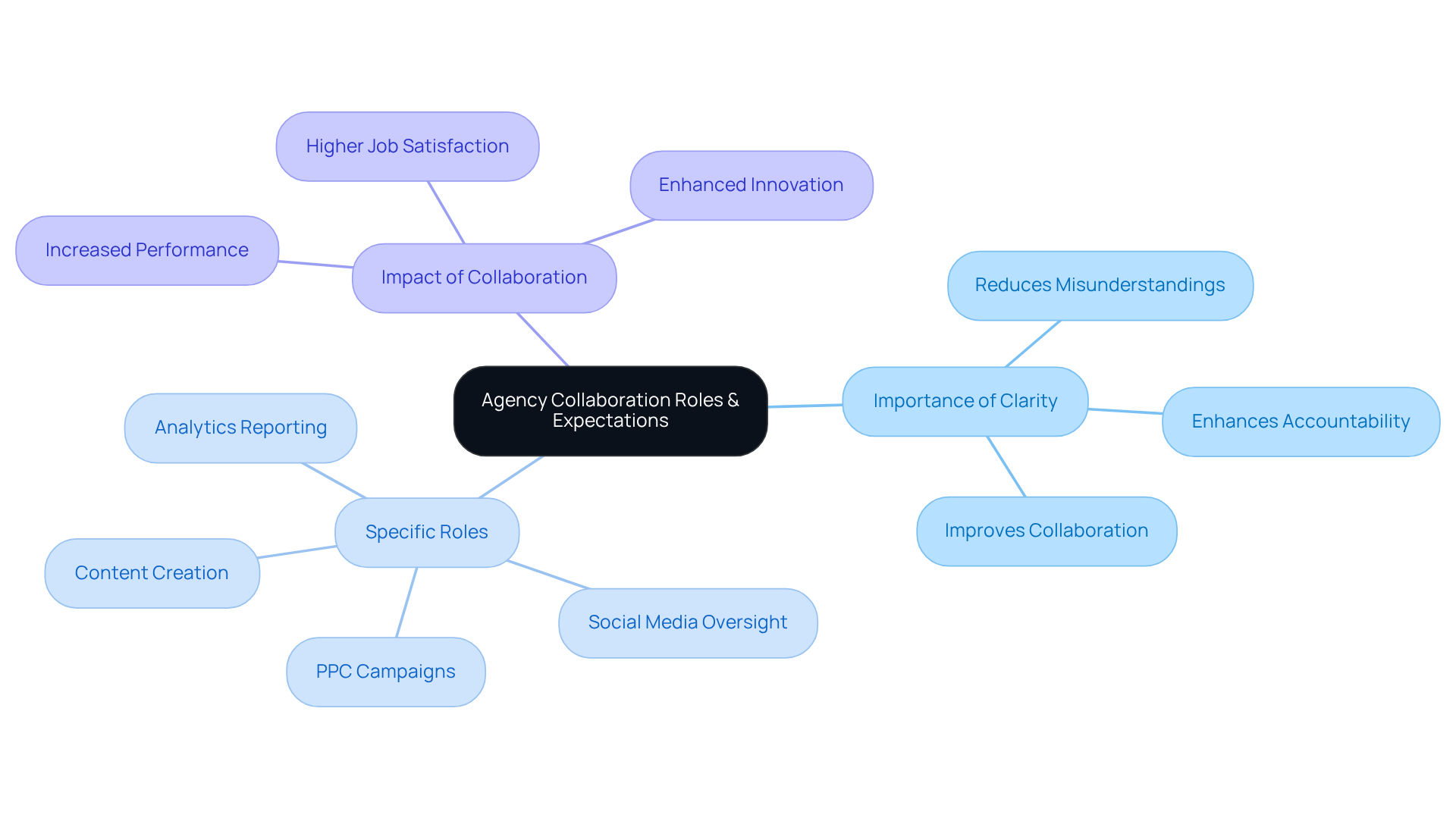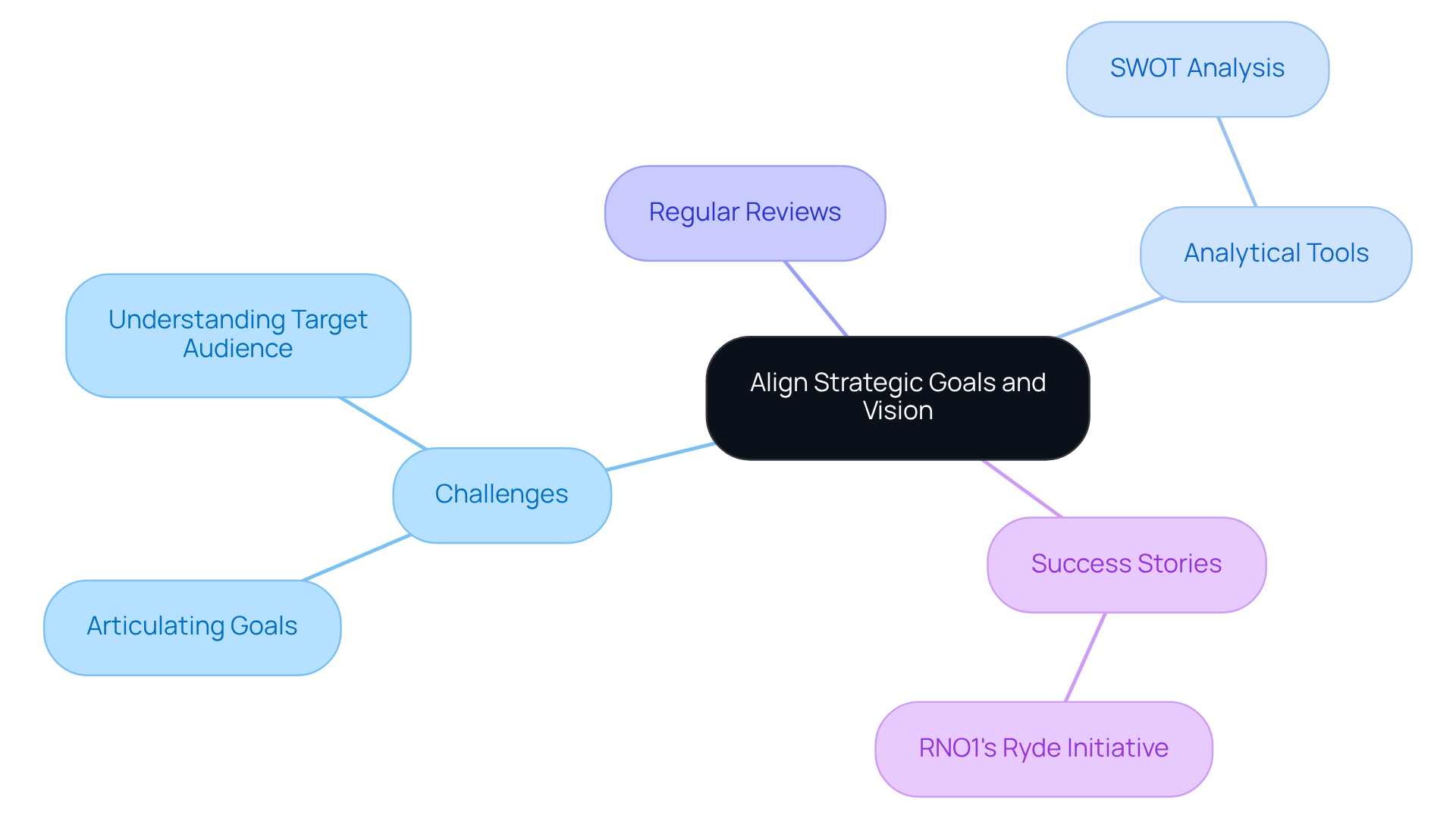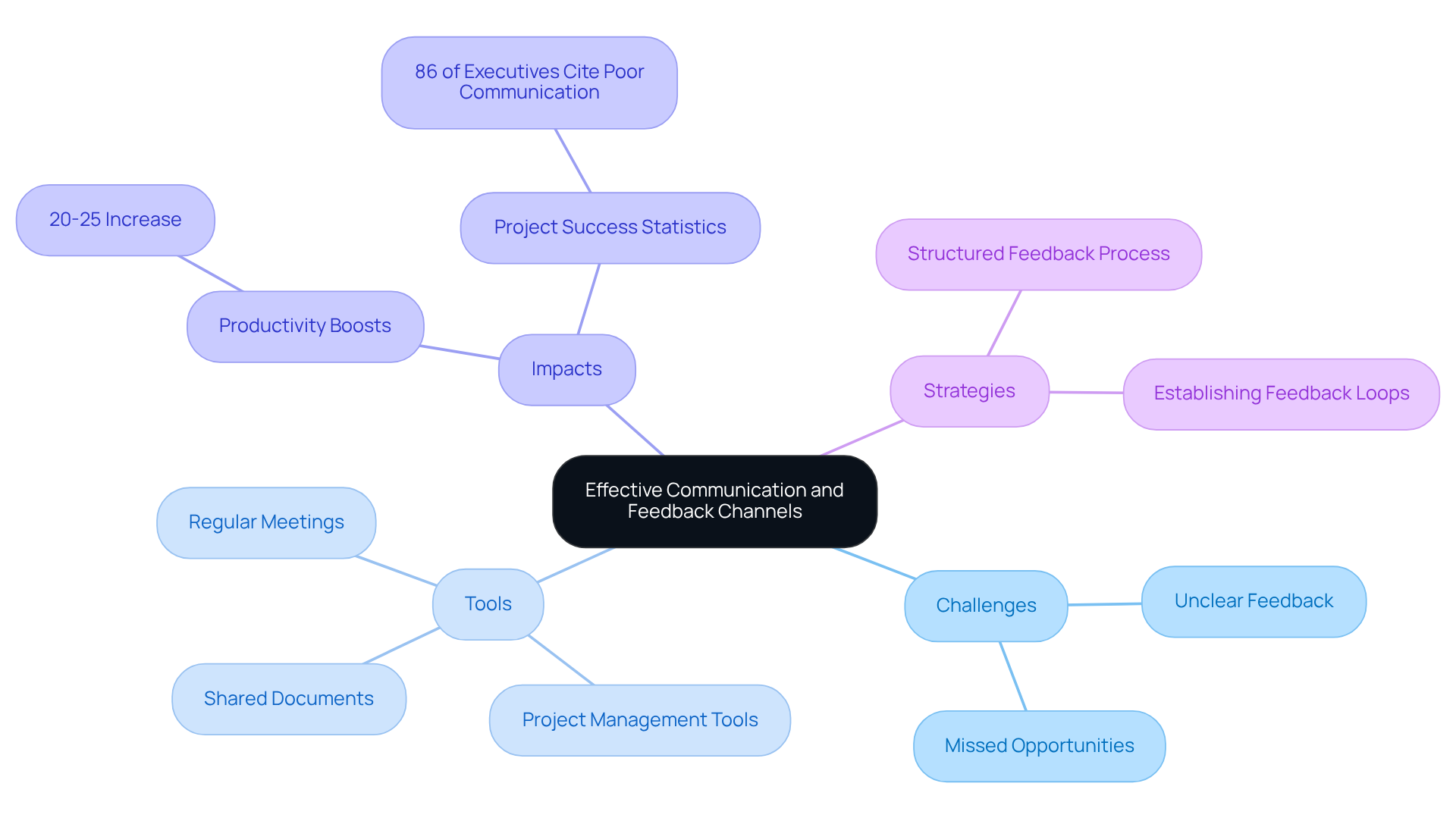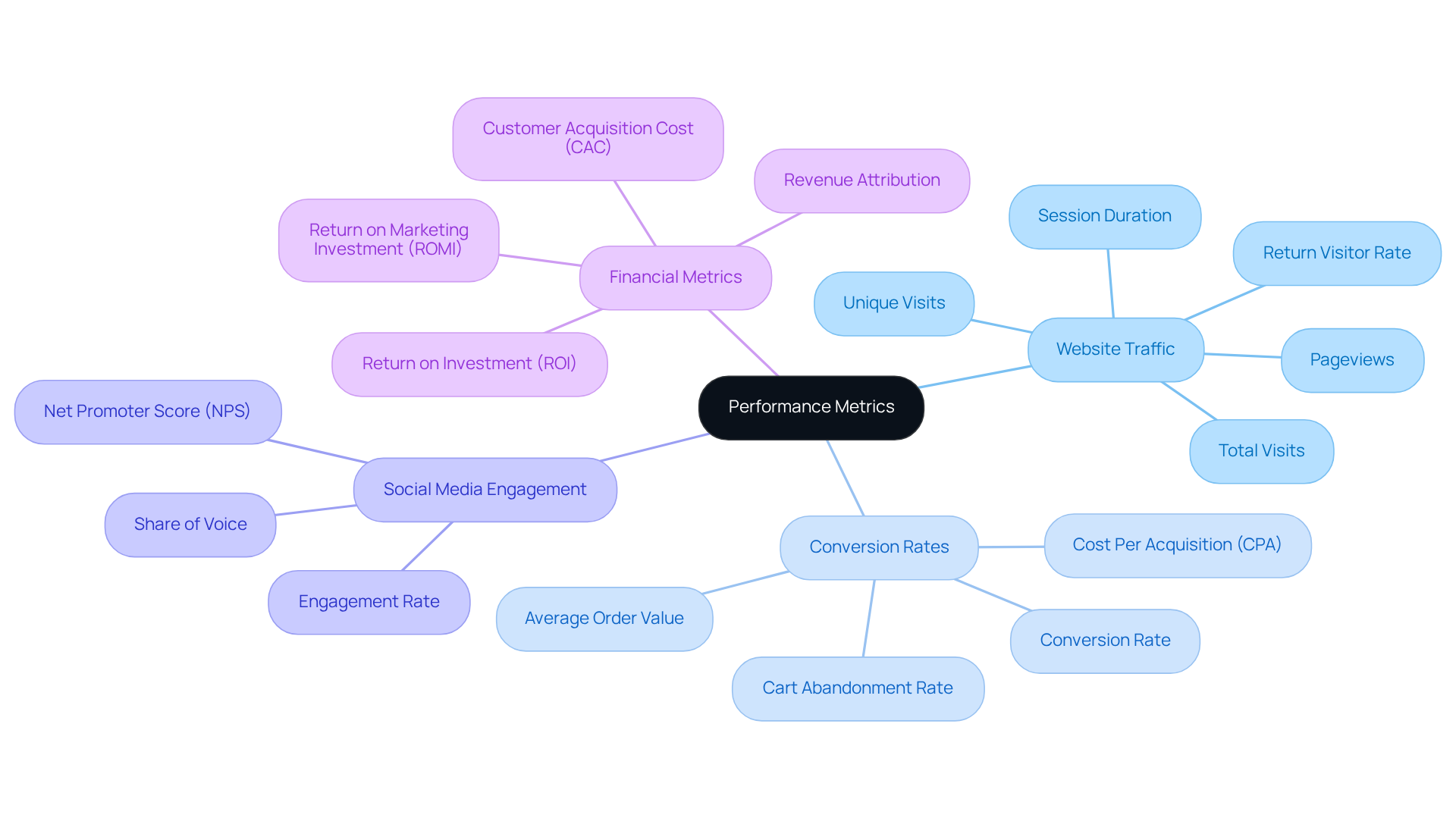Overview
Choosing a marketing agency can be a daunting task for brands, often fraught with challenges like unclear roles and expectations. This uncertainty can lead to misaligned strategic goals and ineffective communication, leaving teams feeling frustrated and unsupported. It's essential to recognize that these issues not only hinder progress but can also strain partnerships, making it difficult to achieve desired outcomes.
However, there is hope. By defining roles and expectations clearly, aligning strategic goals, and establishing effective communication, brands can foster collaboration and enhance the effectiveness of their marketing efforts. Statistics reveal that organizations prioritizing clear communication and well-defined roles experience improved performance and stronger partnerships.
At RNO1, we understand the emotional toll that these challenges can take. We are here to support you in navigating this process, ensuring that your marketing initiatives thrive through nurturing collaboration and shared success. Together, we can create a partnership that not only meets your business needs but also nurtures your vision for the future.
Introduction
Navigating the intricate landscape of marketing partnerships can feel overwhelming for brands eager to enhance their reach and effectiveness. With a multitude of agencies competing for attention, the challenge of selecting the right one becomes crucial for success. This article explores four essential practices that not only simplify the selection process but also cultivate a collaborative environment that fosters meaningful results.
How can brands ensure they align their strategic goals with the right agency while establishing clear communication and measurable success metrics? The answers lie in a thoughtful approach to agency collaboration, one that can transform marketing efforts into impactful outcomes.
Remember, you are not alone in this journey; many have faced similar challenges and found their way through supportive partnerships.
Define Roles and Expectations in Agency Collaboration
To ensure a with your promotional firm, it's essential to start by outlining clear roles and expectations. Many founders face the challenge of ambiguity in responsibilities, which can lead to frustration and setbacks. Recognizing who will oversee project management, creative guidance, and results monitoring is crucial, particularly when it comes to effectiveness initiatives.
For instance, if your organization, much like RNO1, is tasked with developing a digital marketing plan that connects audiences through integrated campaigns, it's important to clarify whether they will also handle:
- Content creation
- Social media oversight
- PPC campaigns
- Analytics reporting
Documenting these roles in a formal agreement can significantly reduce misunderstandings; nearly 90% of respondents link workplace failures to poor collaboration or ineffective communication. Furthermore, scheduling regular check-ins allows for reassessing roles as the project progresses, ensuring that everyone stays aligned and accountable throughout the partnership.
Research indicates that 73% of employees involved in collaborative work report enhanced performance, underscoring the advantages of establishing clear roles and expectations. By fostering a more productive and harmonious working relationship with their partners, brands can ultimately achieve better results, particularly when leveraging innovative strategies like those offered by RNO1.

Align Strategic Goals and Vision with Your Agency
Before collaborating with a marketing firm, many founders face the challenge of clearly articulating their brand's strategic goals and vision. This can feel overwhelming, especially when trying to understand your target audience, market positioning, and desired outcomes. For instance, if your aim is to enhance brand recognition in a competitive tech landscape, communicating this to your team becomes vital. It allows them to tailor their strategies effectively, ensuring that everyone is on the same page. Utilizing analytical tools like can be a helpful way to uncover your strengths, weaknesses, opportunities, and threats, guiding your organization in crafting a strategy that resonates with your objectives.
Regularly reviewing these goals during your collaboration is crucial. It helps keep the team's efforts focused and relevant, ultimately leading to better results. Successful stories from tech startups reveal that those with well-defined strategic visions often experience stronger alignment with their partners, resulting in more effective campaigns and growth. By prioritizing clear communication of strategic objectives, brands can foster a more fruitful partnership with their marketing teams, paving the way for innovative and impactful campaigns.
Take RNO1's Ryde initiative as an example; it showcases innovative strategies for scaling omnichannel brand ambassador programs and enhancing e-commerce engagement through influencer partnerships. This approach not only highlights the importance of clarity in communication but also demonstrates the potential for nurturing collaborations that drive success.

Establish Effective Communication and Feedback Channels
To foster effective communication with your marketing team, it’s important to recognize the challenges that arise from unclear feedback channels. Many teams struggle with this issue, leading to frustration and missed opportunities. Imagine the impact of regular meetings, project management tools, or shared documents that facilitate real-time collaboration. When conversations are open, both sides can freely exchange insights and concerns, which is crucial for swiftly addressing any issues. A structured feedback process, for instance, allows for the quick identification of challenges, enabling timely adjustments that can make a significant difference.
Moreover, establishing a feedback loop where your organization shares insights on your brand's performance can greatly enhance your strategies. Research shows that organizations with strong communication practices can boost productivity by 20-25%. This statistic highlights how vital effective feedback channels are in driving marketing campaign success. Additionally, it’s worth noting that 86% of executives believe that inadequate communication skills lead to unsuccessful projects. This underscores the critical role that effective communication plays in collaborations.
At RNO1, we understand that as a marketing agency for brands, prioritizing communication in partnerships is essential. Our distinctive subscription models, including Revolve, Retrn, and Ryde, position us as a marketing agency for brands aiming to achieve sustainable growth while ensuring that communication remains at the forefront. We are here to support you in navigating these challenges, fostering an environment where your marketing team can thrive.

Measure Success with Clear Performance Metrics
To effectively assess the success of your agency's initiatives, it’s crucial to establish evaluation metrics that resonate with your strategic goals. Many founders face the challenge of understanding whether their efforts are truly making an impact. Key performance indicators (KPIs) like website traffic, conversion rates, social media engagement, and return on investment (ROI) can feel overwhelming, yet they are essential in navigating this journey.
For instance, if your aim is to boost online sales, focusing on eCommerce-specific metrics such as cart abandonment rates and average order value can illuminate the path forward. It's encouraging to note that email marketing can generate $38 in revenue for every dollar spent, showcasing the potential of effective marketing metrics.
By consistently evaluating these metrics with your team, you foster transparency and create an environment where informed modifications to your strategy can flourish. Employing sophisticated analytics tools can offer valuable insights into effectiveness, allowing both parties to celebrate successes and identify areas needing attention.
As Jared Schwitzke pointed out, RNO1's design-first mindset and significant results illustrate the value of a data-driven approach. This approach not only clarifies expectations but also strengthens the bond between brands and their marketing agency for brands, ensuring a shared commitment to success.
Furthermore, RNO1's innovative advertising strategies, particularly in collaboration with Cirkul, establish it as a marketing agency for brands that elevates eCommerce through hyper-scaling solutions. This makes it essential to track metrics like and Return on Marketing Investment (ROMI) to understand the financial effectiveness of your marketing efforts.
RNO1's unique subscription models further support ongoing collaboration, enhancing your ability to track and improve these critical performance metrics. Together, we can navigate this landscape, ensuring that your agency thrives.

Conclusion
Choosing the right marketing agency can feel overwhelming, a pivotal decision that weighs heavily on a brand's success. It’s essential to focus on practices that truly matter. By:
- Defining roles and expectations
- Aligning strategic goals
- Establishing effective communication
- Measuring success with clear performance metrics
brands can foster partnerships that not only drive results but also nurture collaboration. These practices clarify responsibilities and ensure that both parties are united in their efforts, enhancing effectiveness.
As we reflect on this journey, it becomes clear that open communication and well-defined roles are vital in preventing misunderstandings that can stall progress. When strategic goals align with the agency's vision, it paves the way for tailored strategies that resonate deeply with the target audience. Moreover, effective feedback channels cultivate a culture of openness and continuous improvement. By measuring success through relevant performance metrics, brands gain insights that refine their marketing efforts, ensuring that every initiative leaves a meaningful impact.
The importance of these practices cannot be overstated. Brands that prioritize these key areas find themselves better equipped to navigate the complexities of marketing collaborations. By embracing these strategies, organizations can cultivate strong partnerships with their marketing agencies, setting the stage for innovative campaigns that not only meet but exceed expectations. Committing to these best practices will lead to sustainable growth and success in an ever-evolving marketplace, fostering a sense of community and shared purpose among all involved.
Frequently Asked Questions
Why is it important to define roles and expectations in agency collaboration?
Defining roles and expectations is crucial to avoid ambiguity in responsibilities, which can lead to frustration and setbacks in the partnership.
What are some specific roles that should be clarified in a collaboration?
Specific roles that should be clarified include project management, creative guidance, content creation, social media oversight, PPC campaigns, and analytics reporting.
How can documenting roles in a formal agreement help in agency collaboration?
Documenting roles in a formal agreement can significantly reduce misunderstandings, as nearly 90% of workplace failures are linked to poor collaboration or ineffective communication.
What is the benefit of scheduling regular check-ins during a project?
Regular check-ins allow for reassessing roles as the project progresses, ensuring that everyone stays aligned and accountable throughout the partnership.
What impact does establishing clear roles and expectations have on employee performance?
Research indicates that 73% of employees involved in collaborative work report enhanced performance when clear roles and expectations are established.
How can brands achieve better results through agency collaboration?
By fostering a more productive and harmonious working relationship with their partners and leveraging innovative strategies, brands can achieve better results in their initiatives.




